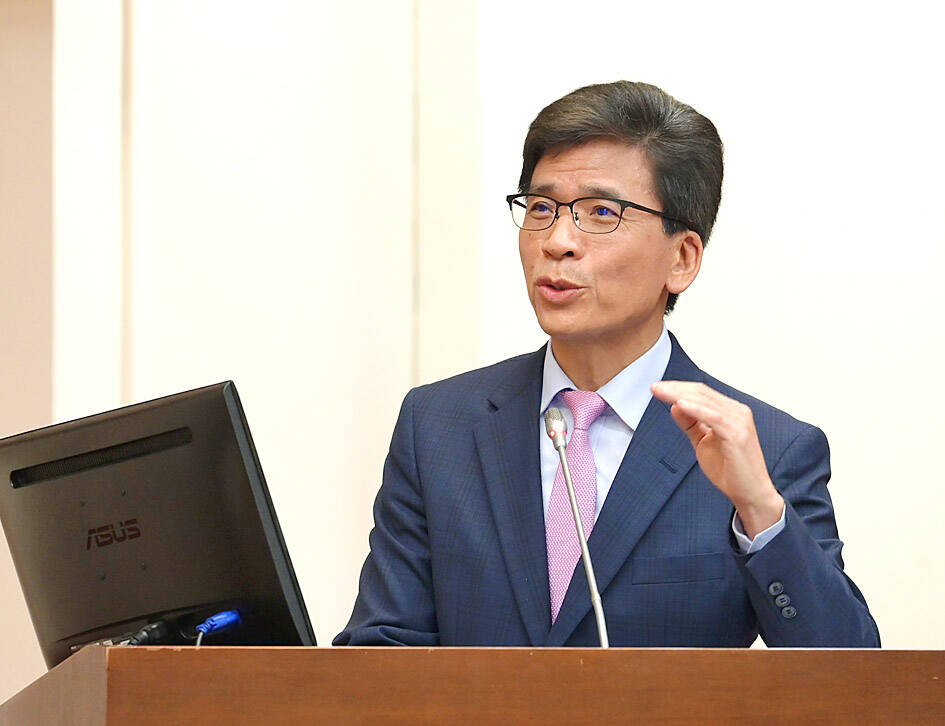Taiwanese insurers are facing difficult questions about the damage of recent swings in the New Taiwan dollar. Regulators might have a partial solution: letting firms change how they calculate the value of foreign currency assets.
The Financial Supervisory Commission (FSC) is considering allowing insurers to use six-month average exchange rates when they calculate risk-based capital in their semiannual reports, a shift from the current system where insurers use exchange rates on the final day of reporting.
The change could ease pressure on the US$1.2 trillion insurance sector, whose huge exposure to foreign assets came into the spotlight earlier this month after a rapid surge in the NT dollar against the greenback.

Photo: Wang Yi-sung, Taipei Times
“This will offer some breathing space for selected lifers where risk-based capital is close to the regulatory requirement,” Societe Generale SA Greater China economist Michelle Lam (林雪潔) said.
Still, the currency was likely to appreciate further against the greenback, meaning insurers would not entirely be spared the need to hold more capital, she added.
The change is still being considered by the commission, but FSC Chairman Peng Jin-lung (彭金隆) told lawmakers yesterday that the regulator was “inclined to agree with the proposal from the life insurance association” to switch to six-month exchange rates for the calculation.
“We’ll prioritize stability in the market and a smooth transition to the new capital requirements rules in 2026,” he said, adding that the regulator would make a decision on easing the rule by the end of next month.
Peng told a news conference on Tuesday that Taiwan’s insurance companies have enough cash on hand, and would not have liquidity issues.
The NT dollar’s more than 8 percent surge against the greenback over the past month has forced local insurers to either pay up to hedge against further currency gains or face the risk of growing paper losses on their approximately US$780 billion in foreign assets, most of which are in US dollars.
Local insurers have been divided on how best to respond to the currency volatility.
Taiwan Life Insurance Co (台灣人壽) chairman Paul Hsu (許舒博) in an interview last week said that the currency swings were causing him sleepless nights.
His firm is considering diversifying its investments across different currencies and issuing more US dollar-denominated policies to lower the risk of currency mismatches, he said.
Fitch Ratings on Friday last week revised its outlook for the life insurance sector to “deteriorating” from “neutral,” adding that exchange rate movements might affect Taiwanese life insurers’ capitalization and earnings.
Insurers are likely to hedge more of their foreign currency assets in response to the recent volatility, Fitch said.
The NT dollar yesterday edged 0.14 percent higher against the greenback to close at NT$29.910 in Taipei trading.

In Italy’s storied gold-making hubs, jewelers are reworking their designs to trim gold content as they race to blunt the effect of record prices and appeal to shoppers watching their budgets. Gold prices hit a record high on Thursday, surging near US$5,600 an ounce, more than double a year ago as geopolitical concerns and jitters over trade pushed investors toward the safe-haven asset. The rally is putting undue pressure on small artisans as they face mounting demands from customers, including international brands, to produce cheaper items, from signature pieces to wedding rings, according to interviews with four independent jewelers in Italy’s main

Japanese Prime Minister Sanae Takaichi has talked up the benefits of a weaker yen in a campaign speech, adopting a tone at odds with her finance ministry, which has refused to rule out any options to counter excessive foreign exchange volatility. Takaichi later softened her stance, saying she did not have a preference for the yen’s direction. “People say the weak yen is bad right now, but for export industries, it’s a major opportunity,” Takaichi said on Saturday at a rally for Liberal Democratic Party candidate Daishiro Yamagiwa in Kanagawa Prefecture ahead of a snap election on Sunday. “Whether it’s selling food or

CONCERNS: Tech companies investing in AI businesses that purchase their products have raised questions among investors that they are artificially propping up demand Nvidia Corp chief executive officer Jensen Huang (黃仁勳) on Saturday said that the company would be participating in OpenAI’s latest funding round, describing it as potentially “the largest investment we’ve ever made.” “We will invest a great deal of money,” Huang told reporters while visiting Taipei. “I believe in OpenAI. The work that they do is incredible. They’re one of the most consequential companies of our time.” Huang did not say exactly how much Nvidia might contribute, but described the investment as “huge.” “Let Sam announce how much he’s going to raise — it’s for him to decide,” Huang said, referring to OpenAI

The global server market is expected to grow 12.8 percent annually this year, with artificial intelligence (AI) servers projected to account for 16.5 percent, driven by continued investment in AI infrastructure by major cloud service providers (CSPs), market researcher TrendForce Corp (集邦科技) said yesterday. Global AI server shipments this year are expected to increase 28 percent year-on-year to more than 2.7 million units, driven by sustained demand from CSPs and government sovereign cloud projects, TrendForce analyst Frank Kung (龔明德) told the Taipei Times. Demand for GPU-based AI servers, including Nvidia Corp’s GB and Vera Rubin rack systems, is expected to remain high,